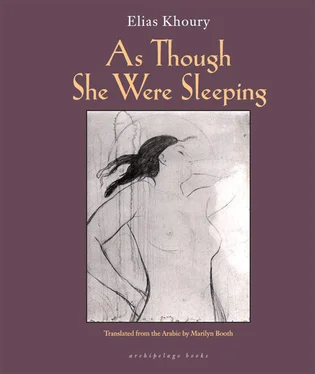Yusuf spoke, or tried to speak, but his father commanded him to be silent. You! Not a word from you — get out of here and leave me to make the woman understand what the real story is. You want to know the story, woman, fine. The one that everyone knows? The one about the French soldier you’ve been wearing black for all your life? I’m the one who secured your honor and maintained the dignity of your family. Don’t make me say any more than this!
Salim broke speech with speech; he said what is not said; he undid the buttons on the long black gown and stripped naked the spirit of the woman standing before him. Hasiba’s knees gave out and she collapsed. Her young son sank down to crouch next to her like a faithful dog. On that day Yusuf decided to forever treat his father with contempt. He had endured the cleft chiseled in his eyelid by the rock with long and silent patience. His mother’s cry of agony offered him the prospect of revenge and a stab at the truth. He even felt himself capable of striking this man who had transformed his impotence into a notorious love story with an Egyptian woman who had taken up prostitution as a profession. But his mother’s collapse and her exposure, through her husband’s words, kept him sitting next to her like a dog who did not even dare to bark.
Yusuf thought his father was an idiot — enough of an idiot, perhaps, to not even realize the truth. Maryam had not really been his, after all. Khawaja Efthymios gave her the house as a means of income. He had had his fill of her and giving the house to her meant regaining himself. He did not actually even give it to her, for it was never recorded in her name. He gave her the use of it for life. That is how Salim was able to buy the house from Efthymios’s heirs after her death. The woman turned this house in Daaboul Street, off the Street of the Archangel Mikhail, into a den of prostitution. There, behind a thick screen of trees, the man who had bought a house and allowed his mistress to live in it had also given her the means to live from it.
You’re an ass, Papa, said Yusuf. She was just a whore who wasn’t worth a penny.
Shut up, you — you son of a bitch! Salim screamed at his son before turning toward his wife and shaming her by hurling the story at her that she had believed buried within her ribs. For the blond youth with eyes the hue of the sky she had carved out a tomb in her heart and buried him there. It had been love but there had been no story. She saw him twice and he spoke to her once. No, in fact he had not said a thing. He had smiled at her and disappeared. That was the whole of it. But it had been love. She had felt her senses collapse into singularity, seeing nothing and no one except the blond young man and smelling only a white fragrance given off by the body of a man as white as snow. Hasiba did not know how her sisters learned of the story. She had wrapped herself in black to erase all traces of the white angel. Then she married Salim Shahin the carpenter, who barely got any work, in order to quiet the pounding of her heart. The marriage extinguished both heart and body. And now Salim — whose impotence and infidelity she had endured — was opening the wound, pulling from her guts the corpse of the blue-eyed young man.
Hasiba was broken. Her lips, pressed together, began to tremble and she sat in a corner, weeping without tears. Yusuf felt smothered. He wanted to understand. He imagined himself as the son of a Frenchman whose name he did not know and about whom he could ask no one.
After her son’s marriage Hasiba consented to the project of adding a wing constructed of concrete to the house — just as it was Hasiba who had encouraged him to remove his abaya forever and adopt European clothing, another tale that entered the history of the Shahin clan as a staple in their day-to-day storytelling. Yusuf was always acting out the story in front of his children, though Saadeh would order him to shut his mouth, for now the girl was becoming a young lady and for shame, telling that story! But this man (who, home from his shop, peeled off his trousers immediately and put on his long dishdasha, refusing to buy pajamas because he feared restricting his testicles at night) paid no attention to his wife’s rebuke. Instead, he described yet again how cramped and squashed, even unable to breathe, he had felt when he tried on trousers for the very first time. He did not know how to arrange his parts; a leaden pain dragged through his lower body and he could barely walk. Reaching the church door with his bride on his arm, he was certain he would collapse onto the ground. The truly awful difficulty he recalled was emerging from the church with the terrible realization that his trousers were about to split from the load that pressed insistently against the seam.
Yusuf never tired of telling the story that worked up Beirut in the 1920s. Very quickly, after the fall of the Ottoman Empire and the occupation of Syria and Lebanon, people adopted their new monarchs’ religion. Wearing trousers became a common sight among the middling classes. The upper classes — Mr. Efthymios’s social world — had grown accustomed to trousers at the start of the century under the influence of the men who had led the Ottoman Empire’s reforms and believed that going European would solve their society’s problems. Wearers of European fashion were exposed to the mockery of ordinary people: even Maryam the Egyptian could not help but laugh with Salim at the apparatus Mr. Efthymios displayed, his trousers as tight as could be, whereas the moment the seventyish man took them off the reality was as clear as daylight.
In essence, Beirut experienced its phase of European fashion as though it were a carnival of laughs: men walking with their feet unnaturally far apart, as if every male in the city had suddenly gone lame; endless jokes; and a devastating sense of professional impotence among the traditional tailors who could not accustom themselves to the new style of apparel.
Later on, Yusuf said, he figured out the consequence of trousers: they demonstrated the sanctity of manhood, putting it on display for all to see. But, he admitted, he had not always been so comfortable. In the beginning, he said, I would always be so conscious of what God gave me, but that is shameful. I would always stand up when I was wearing trousers, feeling I could not sit down. Then I got used to it. And now — God help us! — they say women are wearing trousers. Look what we’ve come to — women showing themselves off, and men as well, what a world we live in! We thought when we put on trousers it would mean facing the Day of Judgment, and then we found out that it didn’t mean a thing.
So why don’t you shave your moustache and take off your tarbush? Salim asked him.
You’re talking like a Frenchman, son. Where you get that from, I simply don’t know!
What do they have to do with each other?
A man without a moustache! What’s left of him? And the tarbush — not a chance. Ask your mother. You’ll never see me without a tarbush — it only comes off when I go to bed. Even when I’m asleep — when I dream about myself, I’m wearing that tarbush. A bare head is uglier and more disgusting than a naked body. I don’t know how you can do it, Salim. Yes, I know the world has changed and everything changes — not for me, though. When I’m dead, bury me in that tarbush.
After Yusuf’s death Saadeh dressed him in a long traditional robe and mantle and his tarbush. The holy sister said it was not right; people must face their Maker with heads bared. They tugged the tarbush off his head and laid it beside him on his deathbed. When they carried the bier to the gravesite the tarbush sat atop the coffin, its black tassel dancing in time with the wooden box as it swayed and tipped on the shoulders that bore it — as if the man’s final communication was ensconced in that thin black shadow. Then the tarbush disappeared. Milia believed they had buried it alongside Yusuf but three days after his death she saw her father’s tarbush on her brother Niqula’s head — tantamount to a proclamation that the new head of the family had been born.
Читать дальше












